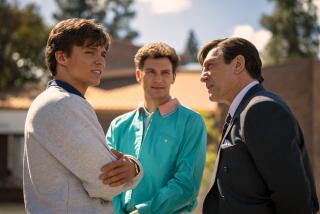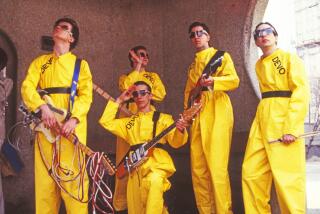The Brothers Grim
- Share via
Jim and Ken Wheat classify themselves as working screenwriters--which means that, after a career that spans more than two decades in the business, “you learn to have strong finger muscles just to hang on,” Ken says.
“We’re more like migrant laborers moving from crop to crop,” Jim adds. “You’re always looking for the next job.”
Still, the Wheats work relatively steadily, though they do so in a kind of industry backwater: sequels, low-budget sci-fi and scare fare, TV movies. Now, to a resume that includes “The Fly II,” “The Stepford Husbands” and “Nightmare on Elm Street 4: The Dream Master,” they can add the sci-fi thriller “Pitch Black,” which opens today.
The soft-spoken, middle-aged brothers have found their way in Hollywood largely by writing screenplays that can frighten teen audiences, an irony not lost on them. Notes Jim, “We found our niche doing scary things. A lot of our friends commented on how two nice, mild-mannered guys could come up with such things.”
“Pitch Black,” which generated early buzz on the Internet for its imaginative reworking of several familiar science-fiction and horror conventions, crash-lands a spaceship full of travelers (including a serial killer) on a planet that has three suns and seemingly no night. Then the lights go out and the planet’s photophobic inhabitants emerge, ready to feed.
“Our models were movies like ‘Five Came Back,’ ‘Sands of the Kalahari’--and ‘Stagecoach,’ ” says Ken, the older of the siblings at 49. “You’ve got characters battling the elements, deadly natives--and they’re fighting with each other.”
Adds Jim, 47, “It all goes back to ‘Stagecoach’--desperate characters thrown together, forced to depend on each other if they’re going to survive. And you know they all won’t.”
Having toiled in the vineyards of made-for-TV movies for much of the ‘90s, the Wheats are excited at the prospects of “Pitch Black.” They hope the film, which stars Vin Diesel (who is also in “Boiler Room,” opening today) and Radha Mitchell (“High Art”), could be the kind of genre potboiler that crosses over to mass-audience success. The breakout success of such genre films as “Sixth Sense,” and “The Blair Witch Project” in the past year--and of course “The Scream” trilogy--proved a film didn’t have to be a major epic to be a blockbuster.
“Pitch Black” began with an idea suggested to the Wheats by executives at Interscope Films: a vague idea about people landing on a planet with perpetual daylight that goes through an eclipse--at which point ghosts attack.
“That was our jumping-off point,” Ken says. Adds Jim, “We came back with a story of who the people are, how they get there and what the creatures are. What we were after was the spirit of castaways trying to survive.”
What made “Pitch Black” such an anomaly, they say, was the fact that, while their director, David Twohy, put his own stamp on the film, he did it in ways that far exceeded the Wheats’ expectations.
“It’s not uncommon, after we’re finished with our writing, for the director to go through additional writers,” Ken says. “It can be a frustrating experience if a rewrite or a director interprets it in a different way, and the movie winds up not even close to what you imagined in your head. But David improved upon it, rather than screwing it up.”
(Twohy, a co-author of “Waterworld” and the director of “The Arrival,” rewrote the Wheats’ script for “Pitch Black” and went to Writers Guild arbitration over who would get credit; Twohy and the Wheats wound up with a shared writing credit.) Such is the lot of the writer for hire, especially on the kind of B movie projects they work on. At least, the Wheats say, they are writers who get their films made on a relatively regular basis, no matter the number of subsequent rewriters.
“It’s part of the process,” Jim says with a shrug, adding, “Any movie that actually ends up on the screen is a minor miracle. The nature of the movie business is struggle. If you can last, things happen for you. We’ve been lucky over the years.”
Reared near San Francisco, the pair went to Occidental College in Eagle Rock, where Ken was a drama major, while Jim focused on premed. Ken initially thought he wanted to be a lawyer but realized his fascination with the law stemmed from an early exposure to the “Perry Mason” TV show: “And that had little to do with reality and everything to do with drama,” he says.
Older sibling corrupted younger brother early on in their college career. Ken would circle the Occidental campus in an old station wagon, picking up friends (including Jim) to go to the movies instead of class. Eventually, Jim recalls, “I had to decide--medical school or the movie business.”
It was the medical profession’s loss. The Wheats got their feet wet as executive producers of a Martin Scorsese documentary, “American Boy: A Profile of Steven Prince,” then sold scripts for a pair of genre pieces (“Silent Scream,” a horror film, and “The Return,” a sci-fi tale) that were both made in 1980. And the die was cast: The Wheat brothers became known as crafters of sci-fi, horror and action.
“Those were the first scripts we sold, so those were the genres we were hired to write,” Ken says. “It wasn’t a choice so much as happenstance. But those are genres we enjoyed.”
Fear wasn’t their province exclusively: After they served as writers-directors for the horror-thriller “Lies” in 1983, George Lucas tapped them to write and direct “The Ewoks: The Battle for Endor,” for television in 1985.
Since then, the Wheats have reeled off the aforementioned list of sequels and TV movies. Writing genre sequels can be humbling, they admit. “Coming up with something new makes it challenging to work through the process of writing,” says Jim, to which Ken adds, “At the same time, we don’t want to make ourselves nuts over the fact that our film can’t be better than the ones by William Goldman or David Cronenberg or Alfred Hitchcock.”
The genre conventions are unchanging, harking back to stories told around the campfire. The trick for the Wheats is to find new twists on the old formulas that will please the increasingly movie-savvy young audience that films such as “Pitch Black” appeal to.
“What you try to do is create an environment that is futuristic but still feels real,” Jim says. “Science fiction is always fantasy. But you try to ground it in something believable. You try to put regular people in extraordinary circumstances.”
Adds Ken, “Too many movies concentrate on hardware rather than people.”
Their hope is that a success with “Pitch Black” will give the Wheats the opportunity to move from TV films back into features--not that they have any illusion of becoming a flavor-of-the-month; they’re too wised up in the ways of Hollywood for that.
“That is more a factor with somebody coming out of nowhere,” Jim says. “This isn’t the first movie we got made and it won’t be the last. “We’ve got a drawer full of ideas. We’ll just keep plugging away.”
More to Read
Only good movies
Get the Indie Focus newsletter, Mark Olsen's weekly guide to the world of cinema.
You may occasionally receive promotional content from the Los Angeles Times.










